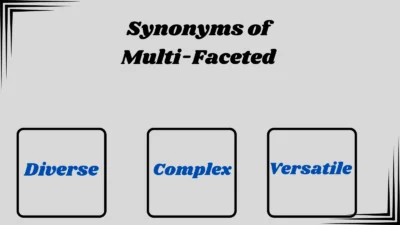Synonyms of sectionalism, such as regionalism, factionalism, and parochialism, describe the focus on a specific region, group, or interest over the larger whole. These words capture different aspects of division, loyalty, and competing interests, helping you explain how local or group priorities influence broader situations.
For example, “regionalism” emphasizes loyalty to a geographic area, while “factionalism” highlights internal divisions within a group.
If you’re writing about history, politics, or social issues, these synonyms of sectionalism not only enrich your writing but also deepen your understanding of conflicts, loyalties, and divisions that shape societies.
What Does Sectionalism Mean?
Sectionalism refers to loyalty to a particular region, group, or interest rather than to a larger entity. It often involves:
- Prioritizing local or group needs over national or collective ones
- Fostering divisions between groups or regions
- Loyalty that can lead to conflict or competition
- Strong identification with a specific area, culture, or ideology
Think of sectionalism as a word that explains how and why groups sometimes put themselves before the whole.
Synonyms & Related Words for Sectionalism (And When to Use Them)
1. Regionalism
Focuses on loyalty to a specific geographic region.
Example: Regionalism shaped the politics of the country during the election.
Use when: Talking about geographical or cultural identities without necessarily implying conflict.
2. Partisanship
Strong support for a specific party or faction.
Example: His partisanship made it hard for him to see the other side’s point.
Use when: Referring to political party loyalty, often with a bias.
3. Sectarianism
Division based on religious or ideological sects.
Example: Sectarianism fueled tensions between communities.
Use when: Describing conflicts or loyalties rooted in religion or ideology.
4. Factionalism
Loyalty to a subgroup within a larger organization.
Example: Factionalism weakened the political party’s ability to unite.
Use when: Highlighting divisions within a single group or party.
5. Parochialism
Narrow-minded focus on a local area or small community.
Example: His parochialism prevented him from understanding global issues.
Use when: Emphasizing limited perspective or local bias.
6. Provincialism
An attitude of being unsophisticated or narrow-minded due to local origin.
Example: The novel critiques provincialism in small-town attitudes.
Use when: Referring to cultural narrowness or simplicity.
7. Isolationism
Policy or practice of avoiding involvement with others.
Example: The country’s isolationism kept it out of international conflicts.
Use when: Talking about political or social withdrawal.
8. Tribalism
Strong loyalty to one’s group or social group, often leading to conflict.
Example: Tribalism sometimes overrides national interests.
Use when: Discussing social or ethnic group loyalty and rivalry.
9. Nationalism
Patriotic devotion to one’s nation, sometimes at the expense of others.
Example: Nationalism surged during times of war.
Use when: Highlighting pride in one’s nation, potentially with exclusionary tones.
10. Nativism
Favoring native-born citizens over immigrants.
Example: Nativism influenced immigration policies in the early 20th century.
Use when: Discussing cultural or ethnic exclusion based on origin.
11. Separatism
Advocacy for separation from a larger group.
Example: The region’s separatism led to calls for independence.
Use when: Referring to political or social movements wanting to break away.
12. Insularity
Being isolated or detached from outside influences.
Example: Insularity can limit cultural growth.
Use when: Emphasizing detachment or exclusion from external ideas.
13. Sectarian loyalty
Allegiance to a particular sect.
Example: Sectarian loyalty often causes friction in multi-religious societies.
Use when: Discussing religious or ideological group loyalty.
14. Clannishness
Behavior that favors one’s own group excessively.
Example: Their clannishness prevented outsiders from joining the community.
Use when: Talking about tight-knit groups that exclude others.
15. Balkanization
Fragmentation of a region into smaller, often hostile parts.
Example: Balkanization led to prolonged conflict in the region.
Use when: Describing political or social fragmentation.
16. Exclusivism
Belief that one’s own group is the only legitimate one.
Example: Exclusivism in the club discouraged diversity.
Use when: Highlighting exclusionary attitudes.
17. Segregation
Separation of groups based on race, religion, or other factors.
Example: Segregation laws enforced racial divides.
Use when: Referring to enforced physical or social separation.
18. Separateness
The state of being separate or apart.
Example: Their sense of separateness made cooperation difficult.
Use when: Emphasizing division without strong emotional connotations.
19. Discord
Disagreement and conflict.
Example: Discord between regions undermined national stability.
Use when: Focusing on conflict resulting from divisions.
20. Disunity
Lack of unity or harmony.
Example: Political disunity weakened the government’s effectiveness.
Use when: Describing the absence of cohesion.
21. Division
Separation into parts or groups.
Example: The division between urban and rural areas shaped policy debates.
Use when: Talking about physical or ideological splits.
22. Segmentation
Dividing something into segments.
Example: Market segmentation targets specific customer groups.
Use when: Describing deliberate grouping, often in neutral or business contexts.
23. Detachment
Emotional or physical separation.
Example: His detachment from local issues made him unpopular.
Use when: Referring to a lack of involvement or interest.
24. Isolation
Being alone or apart from others.
Example: The village’s isolation preserved its traditions.
Use when: Emphasizing physical or social separation.
25. Disaffection
Feeling of dissatisfaction or alienation.
Example: Disaffection with the government grew in rural areas.
Use when: Highlighting emotional distance or dissatisfaction.
26. Alienation
Feeling isolated or estranged.
Example: Alienation from the national government fueled protests.
Use when: Emphasizing emotional or social estrangement.
27. Parochial loyalty
Strong loyalty is limited to a small community or group.
Example: Parochial loyalty sometimes clashes with broader goals.
Use when: Highlighting narrow or local allegiance.
28. Intolerance
Unwillingness to accept views different from one’s own.
Example: Intolerance of minority groups can cause social unrest.
Use when: Discussing negative attitudes toward difference.
29. Bias
Prejudice in favor of or against something.
Example: Regional bias affected the distribution of resources.
Use when: Referring to unfair partiality.
30. Insularity of thought
Limited perspective confined to one’s group.
Example: Insularity of thought limits innovation.
Use when: Highlighting mental or cultural narrowness.
How to Choose the Right Synonym for Sectionalism
Choosing the right synonym depends on the context, emotional tone, and specific nuance you want to convey:
- For geographic or cultural loyalty without conflict: Use regionalism or parochialism.
- For political party loyalty with bias: Go with partisanship or factionalism.
- For religious or ideological divides: Try sectarianism or sectarian loyalty.
- For conflict and division: Use balkanization, discord, or disunity.
- For emotional detachment or dissatisfaction: Consider alienation, disaffection, or detachment.
- For exclusion or narrow-mindedness: Pick insularity, provincialism, or intolerance.
Be mindful of cultural sensitivities — words like tribalism or balkanization carry heavy historical and political weight, so use them thoughtfully.
Conclusion:
Sectionalism refers to strong loyalty to a specific region or group, often at the expense of national unity. Synonyms like regionalism, factionalism, partisanship, and localism highlight different angles of divided interests and internal conflict.
By using the right synonym, you can emphasize the political, cultural, or social dimensions of division more clearly.
Expanding your vocabulary in this area helps you communicate complex historical, political, or social issues with greater accuracy and depth.



